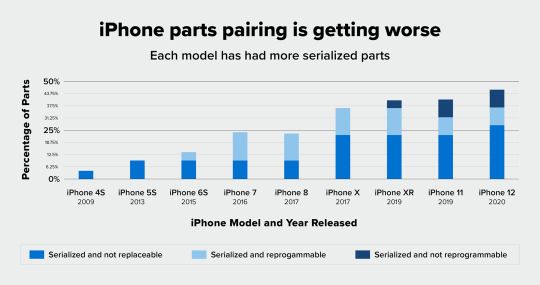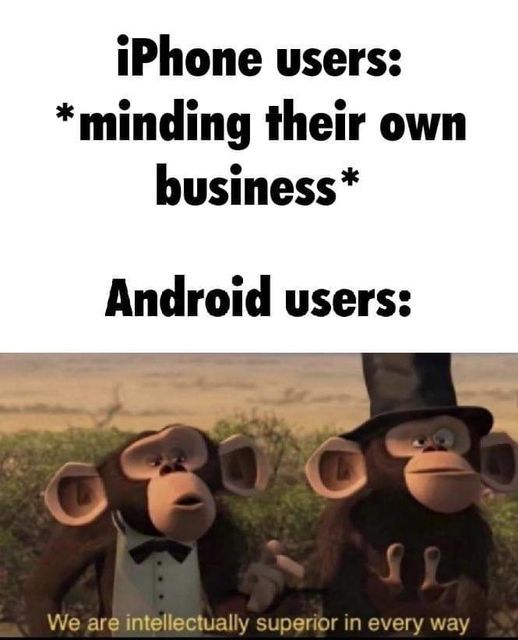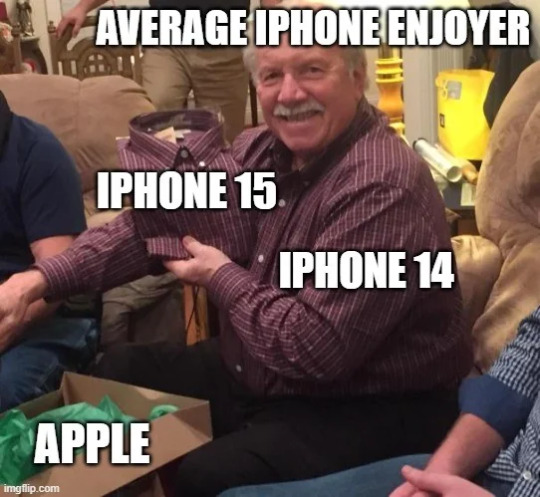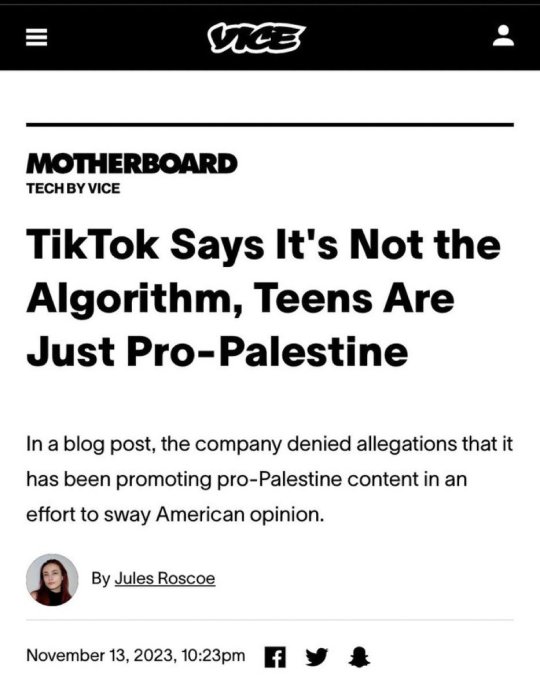#iPhones
Explore tagged Tumblr posts
Text

364 notes
·
View notes
Text
Apple fucked us on right to repair (again)

Today (September 22), I'm (virtually) presenting at the DIG Festival in Modena, Italy. Tonight, I'll be in person at LA's Book Soup for the launch of Justin C Key's "The World Wasn’t Ready for You." On September 27, I'll be at Chevalier's Books in Los Angeles with Brian Merchant for a joint launch for my new book The Internet Con and his new book, Blood in the Machine.

Right to repair has no cannier, more dedicated adversary than Apple, a company whose most innovative work is dreaming up new ways to sneakily sabotage electronics repair while claiming to be a caring environmental steward, a lie that covers up the mountains of e-waste that Apple dooms our descendants to wade through.
Why does Apple hate repair so much? It's not that they want to poison our water and bodies with microplastics; it's not that they want to hasten the day our coastal cities drown; it's not that they relish the human misery that accompanies every gram of conflict mineral. They aren't sadists. They're merely sociopathically greedy.
Tim Cook laid it out for his investors: when people can repair their devices, they don't buy new ones. When people don't buy new devices, Apple doesn't sell them new devices. It's that's simple:
https://www.inverse.com/article/52189-tim-cook-says-apple-faces-2-key-problems-in-surprising-shareholder-letter
So Apple does everything it can to monopolize repair. Not just because this lets the company gouge you on routine service, but because it lets them decide when your phone is beyond repair, so they can offer you a trade-in, ensuring both that you buy a new device and that the device you buy is another Apple.
There are so many tactics Apple gets to use to sabotage repair. For example, Apple engraves microscopic Apple logos on the subassemblies in its devices. This allows the company to enlist US Customs to seize and destroy refurbished parts that are harvested from dead phones by workers in the Pacific Rim:
https://repair.eu/news/apple-uses-trademark-law-to-strengthen-its-monopoly-on-repair/
Of course, the easiest way to prevent harvested components from entering the parts stream is to destroy as many old devices as possible. That's why Apple's so-called "recycling" program shreds any devices you turn over to them. When you trade in your old iPhone at an Apple Store, it is converted into immortal e-waste (no other major recycling program does this). The logic is straightforward: no parts, no repairs:
https://www.vice.com/en/article/yp73jw/apple-recycling-iphones-macbooks
Shredding parts and cooking up bogus trademark claims is just for starters, though. For Apple, the true anti-repair innovation comes from the most pernicious US tech law: Section 1201 of the Digital Millennium Copyright Act (DMCA).
DMCA 1201 is an "anti-circumvention" law. It bans the distribution of any tool that bypasses "an effective means of access control." That's all very abstract, but here's what it means: if a manufacturer sticks some Digital Rights Management (DRM) in its device, then anything you want to do that involves removing that DRM is now illegal – even if the thing itself is perfectly legal.
When Congress passed this stupid law in 1998, it had a very limited blast radius. Computers were still pretty expensive and DRM use was limited to a few narrow categories. In 1998, DMCA 1201 was mostly used to prevent you from de-regionalizing your DVD player to watch discs that had been released overseas but not in your own country.
But as we warned back then, computers were only going to get smaller and cheaper, and eventually, it would only cost manufacturers pennies to wrap their products – or even subassemblies in their products – in DRM. Congress was putting a gun on the mantelpiece in Act I, and it was bound to go off in Act III.
Welcome to Act III.
Today, it costs about a quarter to add a system-on-a-chip to even the tiniest parts. These SOCs can run DRM. Here's how that DRM works: when you put a new part in a device, the SOC and the device's main controller communicate with one another. They perform a cryptographic protocol: the part says, "Here's my serial number," and then the main controller prompts the user to enter a manufacturer-supplied secret code, and the master controller sends a signed version of this to the part, and the part and the system then recognize each other.
This process has many names, but because it was first used in the automotive sector, it's widely known as VIN-Locking (VIN stands for "vehicle identification number," the unique number given to every car by its manufacturer). VIN-locking is used by automakers to block independent mechanics from repairing your car; even if they use the manufacturer's own parts, the parts and the engine will refuse to work together until the manufacturer's rep keys in the unlock code:
https://pluralistic.net/2023/07/24/rent-to-pwn/#kitt-is-a-demon
VIN locking is everywhere. It's how John Deere stops farmers from fixing their own tractors – something farmers have done literally since tractors were invented:
https://pluralistic.net/2022/05/08/about-those-kill-switched-ukrainian-tractors/
It's in ventilators. Like mobile phones, ventilators are a grotesquely monopolized sector, controlled by a single company Medtronic, whose biggest claim to fame is effecting the world's largest tax inversion in order to manufacture the appearance that it is an Irish company and therefore largely untaxable. Medtronic used the resulting windfall to gobble up most of its competitors.
During lockdown, as hospitals scrambled to keep their desperately needed supply of ventilators running, Medtronic's VIN-locking became a lethal impediment. Med-techs who used donor parts from one ventilator to keep another running – say, transplanting a screen – couldn't get the device to recognize the part because all the world's civilian aircraft were grounded, meaning Medtronic's technicians couldn't swan into their hospitals to type in the unlock code and charge them hundreds of dollars.
The saving grace was an anonymous, former Medtronic repair tech, who built pirate boxes to generate unlock codes, using any housing they could lay hands on to use as a case: guitar pedals, clock radios, etc. This tech shipped these gadgets around the world, observing strict anonymity, because Article 6 of the EUCD also bans circumvention:
https://pluralistic.net/2020/07/10/flintstone-delano-roosevelt/#medtronic-again
Of course, Apple is a huge fan of VIN-locking. In phones, VIN-locking is usually called "serializing" or "parts-pairing," but it's the same thing: a tiny subassembly gets its own microcontroller whose sole purpose is to prevent independent repair technicians from fixing your gadget. Parts-pairing lets Apple block repairs even when the technician uses new, Apple parts – but it also lets Apple block refurb parts and third party parts.
For many years, Apple was the senior partner and leading voice in blocking state Right to Repair bills, which it killed by the dozen, leading a coalition of monopolists, from Wahl (who boobytrap their hair-clippers with springs that cause their heads irreversibly decompose if you try to sharpen them at home) to John Deere (who reinvented tenant farming by making farmers tenants of their tractors, rather than their land).
But Apple's opposition to repair eventually became a problem for the company. It's bad optics, and both Apple customers and Apple employees are volubly displeased with the company's ecocidal conduct. But of course, Apple's management and shareholders hate repair and want to block it as much as possible.
But Apple knows how to Think Differently. It came up with a way to eat its cake and have it, too. The company embarked on a program of visibly support right to repair, while working behind the scenes to sabotage it.
Last year, Apple announced a repair program. It was hilarious. If you wanted to swap your phone's battery, all you had to do was let Apple put a $1200 hold on your credit card, and then wait while the company shipped you 80 pounds' worth of specialized tools, packed in two special Pelican cases:
https://pluralistic.net/2022/05/22/apples-cement-overshoes/
Then, you swapped your battery, but you weren't done! After your battery was installed, you had to conference in an authorized Apple tech who would tell you what code to type into a laptop you tethered to the phone in order to pair it with your phone. Then all you had to do was lug those two 40-pound Pelican cases to a shipping depot and wait for Apple to take the hold off your card (less the $120 in parts and fees).
By contrast, independent repair outfits like iFixit will sell you all the tools you need to do your own battery swap – including the battery! for $32. The whole kit fits in a padded envelope:
https://www.ifixit.com/products/iphone-x-replacement-battery
But while Apple was able to make a showy announcement of its repair program and then hide the malicious compliance inside those giant Pelican cases, sabotaging right to repair legislation is a lot harder.
Not that they didn't try. When New York State passed the first general electronics right-to-repair bill in the country, someone convinced New York Governor Kathy Hochul to neuter it with last-minute modifications:
https://arstechnica.com/gadgets/2022/12/weakened-right-to-repair-bill-is-signed-into-law-by-new-yorks-governor/
But that kind of trick only works once. When California's right to repair bill was introduced, it was clear that it was gonna pass. Rather than get run over by that train, Apple got on board, supporting the legislation, which passed unanimously:
https://www.ifixit.com/News/79902/apples-u-turn-tech-giant-finally-backs-repair-in-california
But Apple got the last laugh. Because while California's bill contains many useful clauses for the independent repair shops that keep your gadgets out of a landfill, it's a state law, and DMCA 1201 is federal. A state law can't simply legalize the conduct federal law prohibits. California's right to repair bill is a banger, but it has a weak spot: parts-pairing, the scourge of repair techs:
https://www.ifixit.com/News/69320/how-parts-pairing-kills-independent-repair

Every generation of Apple devices does more parts-pairing than the previous one, and the current models are so infested with paired parts as to be effectively unrepairable, except by Apple. It's so bad that iFixit has dropped its repairability score for the iPhone 14 from a 7 ("recommend") to a 4 (do not recommend):
https://www.ifixit.com/News/82493/we-are-retroactively-dropping-the-iphones-repairability-score-en
Parts-pairing is bullshit, and Apple are scum for using it, but they're hardly unique. Parts-pairing is at the core of the fuckery of inkjet printer companies, who use it to fence out third-party ink, so they can charge $9,600/gallon for ink that pennies to make:
https://www.eff.org/deeplinks/2020/11/ink-stained-wretches-battle-soul-digital-freedom-taking-place-inside-your-printer
Parts-pairing is also rampant in powered wheelchairs, a heavily monopolized sector whose predatory conduct is jaw-droppingly depraved:
https://uspirgedfund.org/reports/usp/stranded
But if turning phones into e-waste to eke out another billion-dollar stock buyback is indefensible, stranding people with disabilities for months at a time while they await repairs is so obviously wicked that the conscience recoils. That's why it was so great when Colorado passed the nation's first wheelchair right to repair bill last year:
https://www.eff.org/deeplinks/2022/06/when-drm-comes-your-wheelchair
California actually just passed two right to repair bills; the other one was SB-271, which mirrors Colorado's HB22-1031:
https://leginfo.legislature.ca.gov/faces/billNavClient.xhtml?bill_id=202320240SB271
This is big! It's momentum! It's a start!
But it can't be the end. When Bill Clinton signed DMCA 1201 into law 25 years ago, he loaded a gun and put it on the nation's mantlepiece and now it's Act III and we're all getting sprayed with bullets. Everything from ovens to insulin pumps, thermostats to lightbulbs, has used DMCA 1201 to limit repair, modification and improvement.
Congress needs to rid us of this scourge, to let us bring back all the benefits of interoperability. I explain how this all came to be – and what we should do about it – in my new Verso Books title, The Internet Con: How to Seize the Means of Computation.
https://www.versobooks.com/products/3035-the-internet-con


If you'd like an essay-formatted version of this post to read or share, here's a link to it on pluralistic.net, my surveillance-free, ad-free, tracker-free blog:
https://pluralistic.net/2023/09/22/vin-locking/#thought-differently

Image: Mitch Barrie (modified) https://commons.wikimedia.org/wiki/File:Daytona_Skeleton_AR-15_completed_rifle_%2817551907724%29.jpg
CC BY-SA 2.0 https://creativecommons.org/licenses/by-sa/2.0/deed.en
--
kambanji (modified) https://www.flickr.com/photos/kambanji/4135216486/
CC BY 2.0 https://creativecommons.org/licenses/by/2.0/
--
Rawpixel (modified) https://www.rawpixel.com/image/12438797/png-white-background
#pluralistic#vin locking#apple#right to repair#california#ifixit#iphones#sb244#parts pairing#serialization#dmca 1201#felony contempt of business model#ewaste#repairwashing#fuckery
1K notes
·
View notes
Text

146 notes
·
View notes
Text
REBLOG FOR MORE DATA!!!!!! THANKS
#phone#phones#iphone#iphones#apple#android#samsung#google#<- i mean ig?? yall r kinda rare 💀#polls#poll#actual poll#actual polls#tumblr polls#random polls#my polls#poll time#hyperspecific poll#social media#tiktoks#tiktok#instagram#instagram reels#youtube shorts#facebook#<- ???#idk my parents use it and theres some short form content there too????#my dads brain is melting 😭😭#hes just like ‘yeah what do you think weve been doing all this time? we have always flicked on tv’#and like- 😭😭😭
37 notes
·
View notes
Text

iPhones cemented onto the floor outside a Xiaomi store in China.
#iphone#iphones#phone#phones#cement#xiaomi#store#stores#china#china travel#what the heck#what teh fuck#whatthe#what the fuck#what the hell#what then#what the flip#woah#like woah#woahhhh#interesting#interesting facts#discover#thats interesting#thats incredible#thats insane#woah :0#woah dude#but woah#woah woah woah
13 notes
·
View notes
Photo

(via This Intense Car Chase Was Shot Entirely With RC Cars)
Vroom by visual artist David Ma
youtube
8 notes
·
View notes
Text

29 notes
·
View notes
Text
11 notes
·
View notes
Text

But this is true, tho.
Mainstream news tends to resent social media because it means they can’t control the message anymore.
Same with BLM. It gets a lot harder to form a narrative when almost everyone has a camera in their pocket.
Not much you can do to refute a guy yelling at a woman on camera: “If I didn’t steal it, someone else would have” when she points out he stole her house and it was an incredibly wrong thing to do.
802 notes
·
View notes
Text
Yo, my mom's getting a new phone and she's finally allowing me to try and move her away from iPhones. What phones do y'all recommend, and do you have anti-Apple propaganda I can share with her?
#apple#ios#apple computers#iphones#phones#technology#apple phones#i've got a moto g power#it's got good battery life and a headphones jack#dunno if that's what my mom would be interested in though#i'm concentrating on steering away from apple before looking for what she might like instead
7 notes
·
View notes
Text

Apple iOS 18 keyboard refuses to autocomplete genocide
#Apple iOS 18 keyboard refuses to autocomplete genocide#apple ios#ios#iphone#apple iphones#apple ipad#apple iphone 15 pro max#apple iphone 16#iphones#class war#boycott apple#fuck apple#antiiphone#boycott#boycotts#gaza genocide#palestinian genocide#israel is committing genocide#stop the genocide#end the genocide#genocide#ausgov#politas#auspol#tasgov#taspol#australia#fuck neoliberals#neoliberal capitalism#anthony albanese
6 notes
·
View notes
Text

🚨Hace unos meses se hizo viral un video sobre un experimento en el que hacían explotar iPhones de forma remota, utilizando únicamente los componentes internos del celular. 😳👇
Mira el video aquí 😱
3 notes
·
View notes
Text
If the settlement is approved, tens of millions of iPhone owners could file claims.
Apple has agreed to pay $95 million to settle a lawsuit accusing the privacy-minded company of deploying its virtual assistant Siri to eavesdrop on people using its iPhone and other trendy devices.
The proposed settlement filed Tuesday in an Oakland, California, federal court would resolve a 5-year-old lawsuit revolving around allegations that Apple surreptitiously activated Siri to record conversations through iPhones and other devices equipped with the virtual assistant for more than a decade.
The alleged recordings occurred even when people didn’t seek to activate the virtual assistant with the trigger words, “Hey, Siri.” Some of the recorded conversations were then shared with advertisers in an attempt to sell their products to consumers more likely to be interested in the goods and services, the lawsuit asserted.
3 notes
·
View notes
Text
Manifesting 4 of the newest iPhones and the best laptop w lots of memory space
#manifestation#loa tumblr#law of assumption#law of attraction#law of manifestation#law of abundance#abundance#iphones#macbook
5 notes
·
View notes